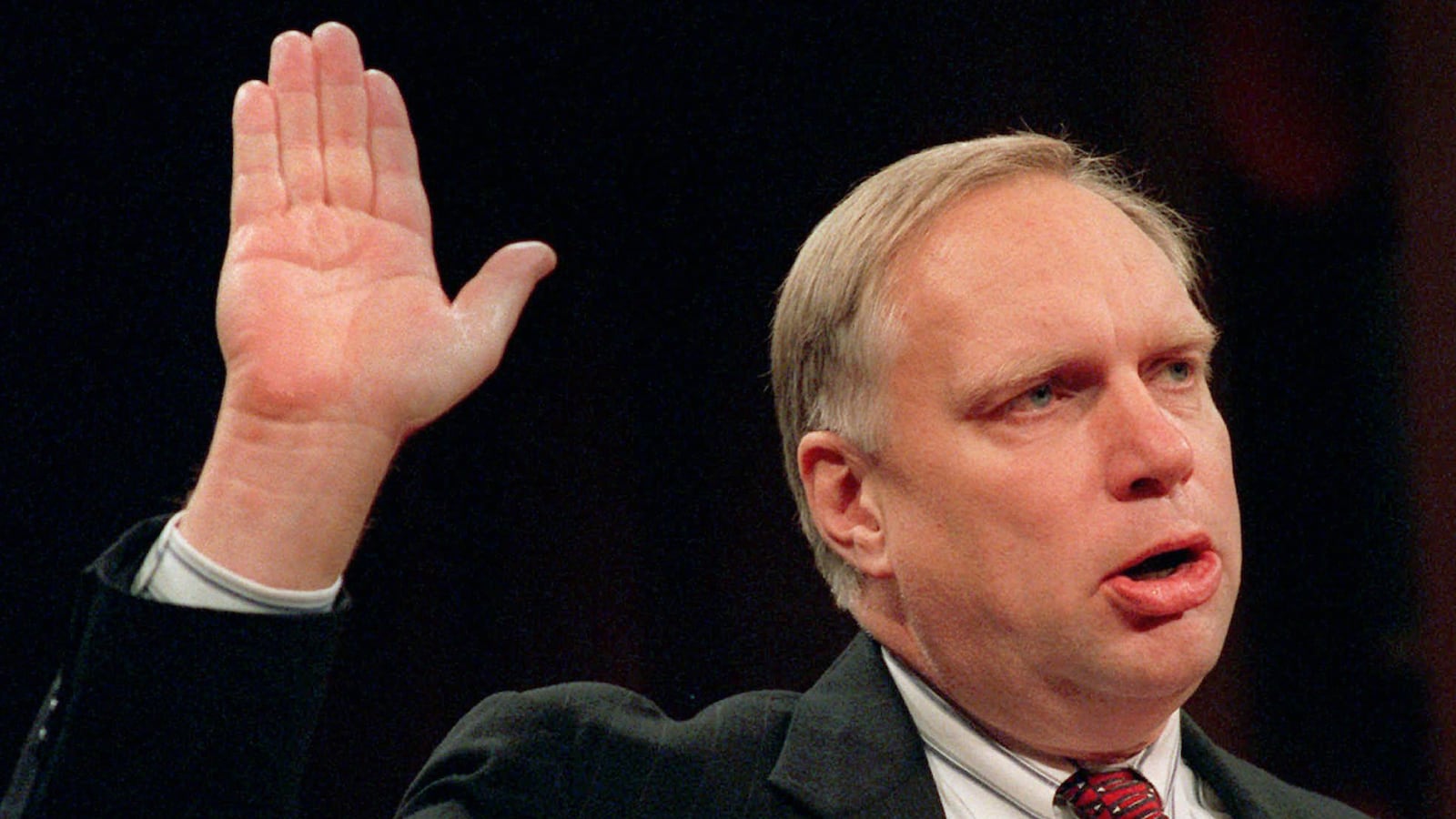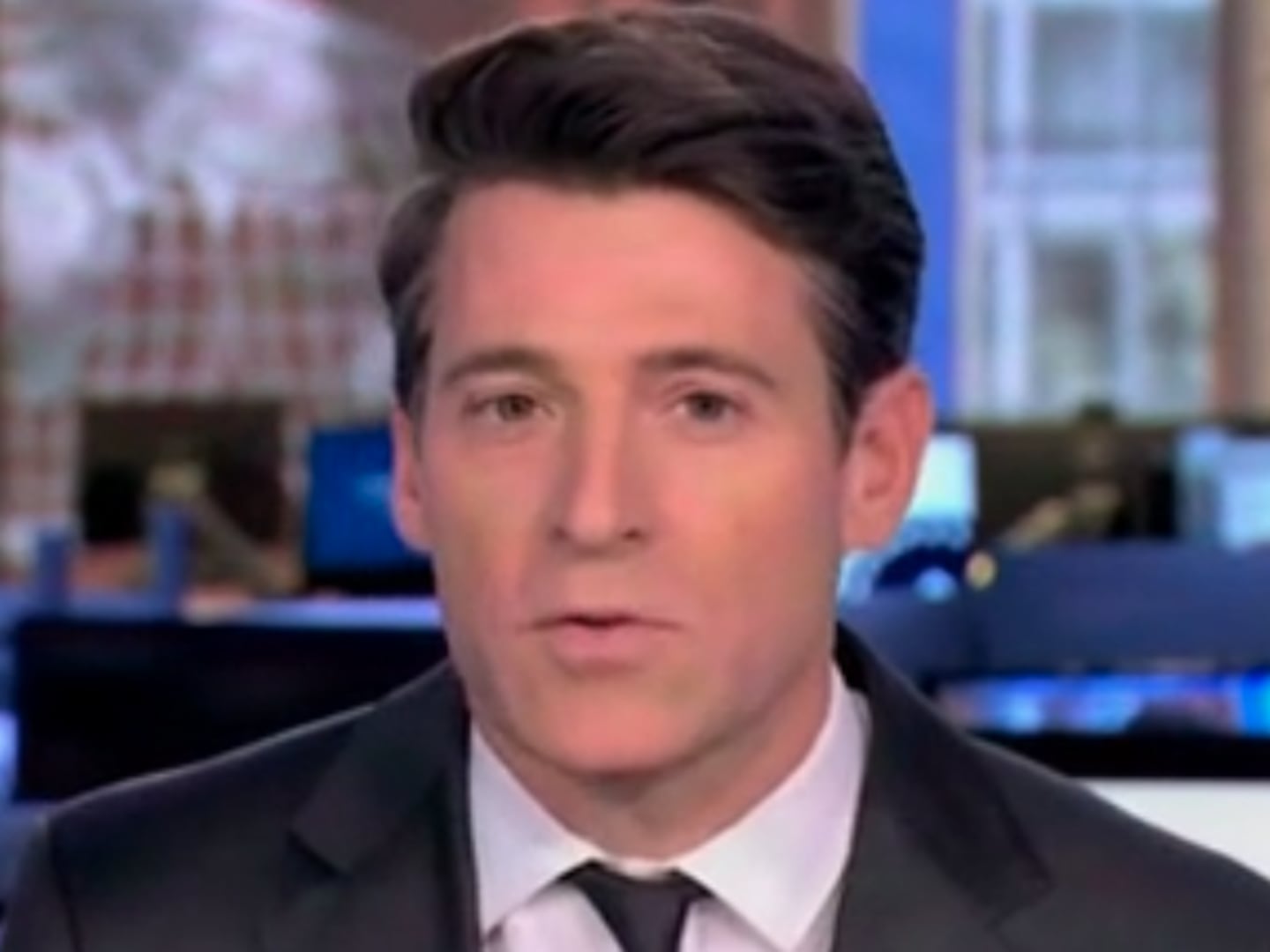“I think Hillary would make a great president,” Webb Hubbell says. “I’d like to see her run. She’ll get elected. But that’s not my call. It’s not my business.”

Nor is it clear that Hillary Clinton will welcome Hubbell’s endorsement. After all, he’s an ex-con—and she has kept a prudent distance for the past two decades.
The last time I spoke with Hubbell—who is just publishing his first novel, a crime thriller titled When Men Betray —he was on the cusp of becoming one of the most important men in Washington.
Back during the Democratic primary season of 1992, I’d phoned him in Little Rock, Ark., to ask how the former Hillary Rodham, Hubbell’s law partner as well as the wife of his best friend, the Governor, navigated her position as an activist first lady while working for the Rose Law Firm, which did ample business with state agencies.
Hubbell was uniquely qualified to field such a question since he was the architect of Arkansas’ freshly enacted ethics-in-government law. He assured me that Hillary was a champ when it came to separating her public service from her private practice. “She’s very, very sensitive about it,” he said.
At the time, Hubbell enjoyed credibility in both politics and jurisprudence; he’d been mayor of Little Rock and chief justice of the Arkansas Supreme Court. He had also triangulated the power map as a trusted intimate of the Clintons, whose presidential campaign would take them to the White House—and place Hubbell high up in the Justice Department as associate attorney general.
Little did I know then that even as we spoke, he was sending inflated bills and filing false expense reports to bilk his law partners and clients out of hundreds of thousands of dollars, and then filing fraudulent tax returns—a cluster of felonies that would eventually land him in the federal penitentiary.
Twenty-two years later, I ask if he minds that I look back on our conversation about Hillary’s ethics with just a touch of irony. Hubbell responds with a hearty laugh. “I would expect that,” he says in a soft tenor voice, with the hint of a Southern lilt.
At 65, Hubbell’s time on earth has been nothing if not novelistic—not only the outlandish career trajectory, fueled perhaps by a ravenous appetite for high living and lavish eating, but also a near-death experience four years ago that required a liver transplant—and renewed his friendship with former president Clinton after a 16-year hiatus.
“When Bill heard that I was pretty close to not being with us, he got on a plane and he came down, and we spent several hours together and kind of reconnected,” says Hubbell, who was suffering from a severe form of nonalcoholic steatohepatitis at Georgetown University Hospital in Washington and awaiting a liver donor.
“You know, it was just like I’d seen him the day before. There was nothing awkward about it. We just started talking.” (Hubbell eventually got his liver—"from a young man who was killed in a hunting accident,” he says—and promptly named it “George,” after Georgetown, only to learn later, eerily, that his donor’s real name was George.)
Since the former president’s visit, Hubbell has spoken several times on the phone with Bill—whom he’s addressed as “Mr. President” since Clinton aide Mickey Kantor instructed him to 21 years ago—but not with Hillary, who has sent a couple of get-well notes. Wasn’t it strange to be cast into the outer darkness by his once-close law partner and golfing buddy? “They were involved in politics,” Hubbell says, trying to explain, “and it was not appropriate for me to reach out to them at all.”
It’s hardly shocking that Hubbell would have a knack for narrative fiction, notwithstanding the sheer imaginative power necessary to have created all those fanciful legal bills and expense account vouchers.
“I think I’ve always been a storyteller,” he says. “A lawyer, to some extent when he talks to a jury, has to learn to tell a pretty good story. Talking to a jury is like telling a story. I wasn’t trained in writing and I never thought about writing a novel until I realized I was going to have a lot of time on my hands. I think there’s always one novel in every one of us.”
This particular novel—appropriately blurbed on the cover by disgraced lobbyist Jack Abramoff, another Washington power player who ended up in the slammer (“riveting plot lines and fascinating characters. I couldn’t put it down!” Casino Jack gushes)—is a surprisingly deft page-turner.
Narrated by a Hubbell-like hero, who can’t help punctuating his tale of murder and intrigue with accounts of gorging on fried chicken and barbecue, it’s set in Little Rock, where old friends find themselves on opposite sides of a spectacular case involving the televised assassination of a handsome, honey-tongued United States Senator. The senator, a college gridiron star, has a coldly Machiavellian widow.
The fictional application of psychic justice on stand-ins for calculating, ambitious politicians who’d abandon loyal friends when they’re down and out?
“No, no, this is fiction,” Hubbell says, dismissing the idea that any of his characters are based on the Clintons or anyone else—even as readers attempt to put names to faces. “I know people will naturally do that and say, ‘I know who that is.’ And I’ll say, ‘No you don’t, because it’s not.’”
These days Hubbell, who has already finished a second novel and is working on a third, spends much of his time blogging—daily religious meditations for his personal web site, TheHubbellPew.com, and twice-monthly political commentary for The Clyde Fitch Report, a web site dedicated to art and politics and named for a once-famous Gilded Age playwright.
Hubbell, who is troubled by the Obama administration’s violations of privacy and use of drones, but applauds Eric Holder’s support of reduced sentences for drug offenders, says his politics “have become more progressive” over the years.
He also makes himself available to criminal defendants facing the prospect of incarceration. Jack Abramoff was one of his students.
“Occasionally a lawyer will call me, who’s got somebody who’s about to go into federal prison, and I kind talk to them just about what to expect,” Hubbell says. “The devil you know is better than the devil you don’t know. I talk about things like, ‘How does your family survive while you’re gone? How do you tell your children? What kind of work are you going to be able to do in prison? How do you get in trouble or stay safe?’ Now and then I still get a call. I had one last year where the guy was in political trouble and about to be indicted, and I was able to talk him through the whole process from the initial indictment to dealing with the press. The thought of going to prison is very frightening.”
He lives quietly—and “simply,” he says—in Charlotte, N.C., where he shares an apartment with his wife Suzy, who toils as a real estate broker while he does the grocery shopping and gasses up the Toyota, in the same city as a married daughter, one of four grown children who have presented the Hubbells with seven grandkids.
“I’ve looked for opportunities to speak and consult,” says Webb, who was paid nearly half a million dollars in consulting fees, business apparently arranged by Clinton associates, in the months before he was indicted two decades ago. “They’ve been few and far between recently.”
After he was forced to resign from the Justice Department after less than a year, as news of an ominous financial dispute with the Rose Law Firm produced embarrassing headlines, he pleaded guilty in December 1994 to stealing at least $394,000 and evading income taxes. He ended up serving 15 months at the federal correctional facility in Cumberland, Md., where—at 6-foot-5 and weighing in at over 300 pounds when he first donned his jumpsuit—he earned the nickname “Big Easy.” He served an additional three months in a Washington, D.C., halfway house.
Although he can no longer practice law—and is prohibited from even applying for a law license in Arkansas—the right to vote has been restored to him, and he’d like to use it to pull the lever for Hillary in 2016.
“I do have a right to vote,” he says, “and I will vote in the Democratic primary and then in the general election.”






